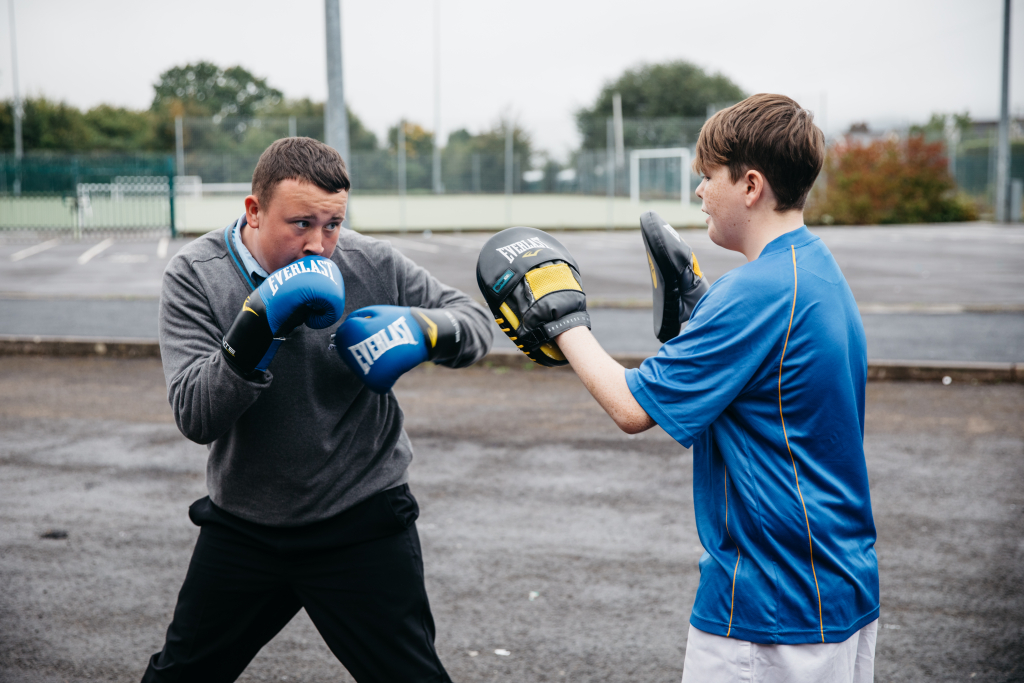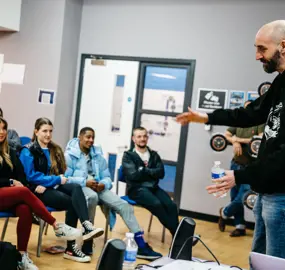When sport is the prescription
Sport has the power to transform lives.
This is the principle upon which Empire Fighting Chance was founded 16 years ago. From day one, our approach has been to harness the power of non-contact boxing to knock down the barriers that vulnerable young people can face when they need support.
Our boxing coaches and therapists use sport as their tool for engagement, and it gets results – just read our Impact Report to see how we do it.
So, it was encouraging to read that a trial of social prescribing for young people by NHS mental health trusts has been launched by UCL. 600 young people aged 11-18 on waiting lists for mental health support in 10 parts of England will be offered their choice of sports, arts and outdoor activities, to see if participation can make them less anxious and depressed.
More than three quarters of young people who spend time on waiting lists see their mental health deteriorate further. Social prescribing has the potential to support them while they wait, by giving them access to creative, physical, and social activities to help build their resilience and self-esteem.
If the trial is successful in improving participants’ mental health, social prescribing could then be rolled out by the NHS across England, potentially helping thousands of young people who are waiting for formal mental health treatment.
There are concerns, including in BMJ Open, that social prescribing currently lacks the evidence base to be rolled out further. However, evidencing the impact of ‘social’ interventions is difficult to do with the same methodologies that might be used for clinical trials, and we cannot discount the decades of research on the positive impact of physical activity on mental health.
Why boxing?
Our Co-Founders, with longstanding careers as boxing coaches, knew first-hand what unique qualities the sport had when they began Empire Fighting Chance’s original after-school programme in 2006. They include:
- Credibility: Boxing has credibility among the families and friends of the young people we work with, who often come from working-class communities. Our gym is a non-stigmatising space which doesn’t feel like the young person is accessing a mental health service.
- Trust: We have found that as young people focus on the physical activity of boxing, such as hitting a punch bag, they relax, drop their guard, and open up. Young people build rapport – and trust – with their coach in a safe space, when they may have negative experiences of relationships with adults in the past.
- Health: Boxing sessions are fun, but physically demanding. Exercise releases ‘feel-good’ chemicals serotonin, endorphins and dopamine, and can reduce anxiety through improved regulation of cortisol, the stress hormone. Boxing can also manage anger issues by providing a physical release in a safe, controlled environment.
More than sport
But Empire Fighting Chance is about more than just boxing.
Olly Parker, from the charity YoungMinds, told the Guardian, “Social prescribing … is a really exciting way of improving mental wellbeing. It looks at people holistically and tries to find non-medicalised ways of helping them find a way through the challenges they may be experiencing. However, it cannot be a substitute for other types of support such as talking therapies.”
At Empire, we know that sport alone is rarely enough to tackle the effects of trauma on young lives. That’s why we use sport as a tool to engage young people with the psychological education and therapeutic interventions which are proven to improve mental health – read about our mentoring and therapy programmes.
The results speak for themselves – the young people we work with see reduced involvement in crime, improved relationships, better mental and physical health, progression into careers, and a more positive outlook for the future.
So, we welcome the social prescribing trial and its recognition that taking part in sport can improve young people’s mental health. But we believe the best interventions are those community-based programmes like our own which use sport as a tool, meet young people where they are at, and show them how to better understand their own minds.
The social prescribing of sport is not a replacement for formal mental health services, and for many young people it will only prevent a deterioration of their condition while they are on a waiting list for support.
But the powerful combination of sport and psychological education which we have developed - which goes further than just social prescribing - can be a solution where other services just don’t work.
It’s got us wondering: could the NHS be prescribing Empire Fighting Chance’s programmes one day?



